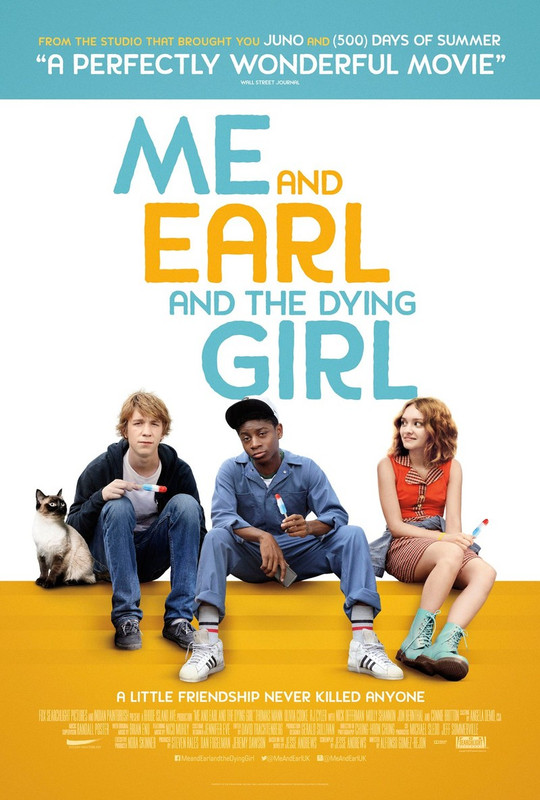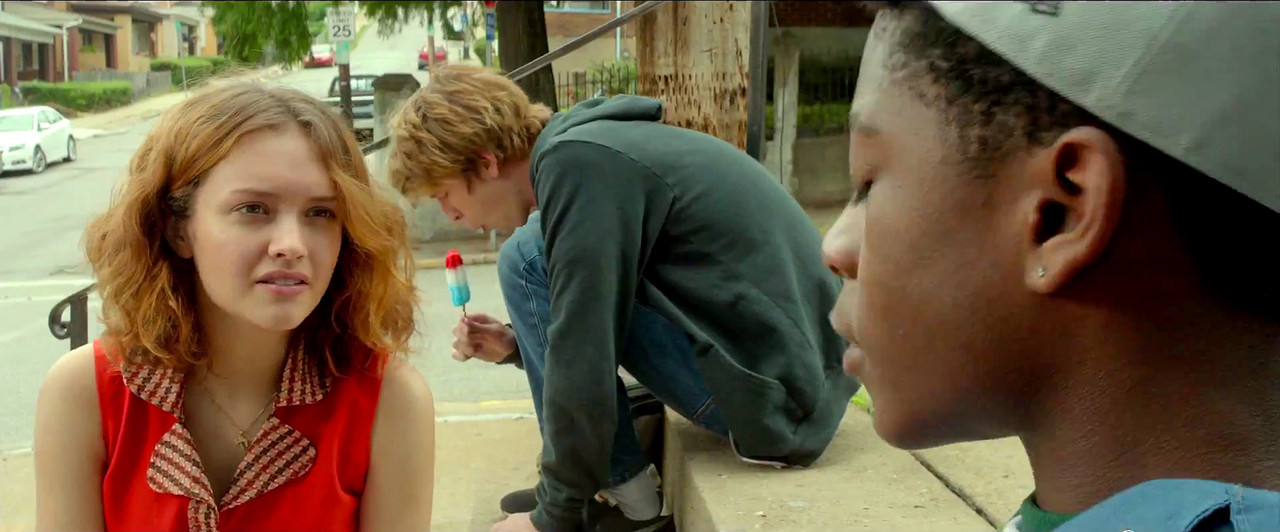Dir: Alfonso Gomez Rejon
Cancer, to understate things quite considerably, fucking sucks. I'm not sure how many movies we need with quirky characters in the prime of their lives struck down by this merciless bastard of a disease before Hollywood will finally decide that this issue – that cancer really fucking sucks – has been clarified once and for all.
Me and Earl and the Dying Girl is basically a slightly less hideous version of the utterly insufferable The Fault In Our Stars, with characters it wants you to be fooled into thinking have more personality than the empty shells that made out in the Anne Frank house in the most staggeringly misjudged scene of the last several years. It has a small measure of mercy in that it doesn't force a romance between the leads, but don't take too much heart from that, it's not as if the film doesn't spend long passages of its running time trying to bully unearned tears out of us.
The Me of the title is Greg (Thomas Mann), a high school senior who doesn't think much of himself and spends most of his time trying to blend in, thinking that if he can get out of high school unnoticed at leas the won't have to be beaten up. Greg's only real friend is Earl (RJ Kyler), with whom he makes punny remakes of arthouse movies called things like A Sockwork Orange, Monorash and 2:38pm Cowboy (to be fair the last of those titles did make me laugh). Earl is… black and appears to like titties, by this film's standards he's a rounded character. The Dying Girl is Rachel (Olivia Cooke), when Greg's mother finds out Rachel has cancer she makes Greg go and hang out with her, inevitably a friendship blossoms. Now, fill in the blanks.
Fill in the blanks would be fine advice for screenwriter Jesse Andrews (adapting his own novel). Rachel in particular is almost entirely empty as a character. Early in the film we see that she has a room that indicates that she likes pillows and has a slightly snarky sense of humour. Beyond that? She's got cancer, and that must serve as a personality substitute. What's really insulting about this that what little personality Rachel does have (which is, for the most part, revealed in the last ten minutes of the film) exists only to facilitate the personal journey of Greg's character.
Greg is more developed, he almost has to be, because despite the title the film's focus is at least 75% on him. Unfortunately, Greg develops from being kind of anonymous into a pretty huge asshole. This journey seems to arrive at its destination in a hideous scene in which he berates Rachel for 'giving up' when, with stage 4 cancer, she elects to stop treatment. Except that's not his worst moment, it's after that scene, as he refuses to see Rachel's side of things, brooding instead on his own hurt feelings. Even if I'd liked the guy before, that alienated me from the character pretty severely.
Of course, you might excuse Greg at this point; it's emotional when your friend is dying, and 17 year olds don't always have the most well thought out reactions to events, but he never seems like much of a friend. He treats being friends with Rachel as a job, an often onerous one at that, which means that the friendship never feels very deep or convincing, certainly not to a degree that justifies the emotional knife twisting of the dreadful final scenes.
Earl seems even more of an afterthought than Rachel. This is a shame because RJ Cutler, for all the weakness of his part, makes an impression. He gets the lion's share of the funny lines (as opposed to Greg's weak sarcastic humour) and shares the films only truly charming scene with Olivia Cooke. This moment, in which the guys, stoned on pot cookies, take Rachel for ice cream, is what the whole film should be. I never felt much connection between Greg and Rachel, but in a couple of minutes of screen time we, and Greg, can see that there is a little spark - platonic at this stage - between Rachel and Earl. Sure, the film would be more conventional if it pursued this line, probably ending up in jealousy between Greg and Earl, but at least it might have had some life in it.
There are a handful of funny moments here, largely supplied by Nick Offerman as Greg's sociology professor father and by Greg and Earl's films, but when the film reaches for the heartstrings it misfires. It's odd how the film misses; it's both flat and trying too hard. I think much of this is down to Thomas Mann, giving as affectless a leading performance as I've seen in a long time. Even at the most emotional moments, as when he's angry at Rachel for 'giving up', Mann is dull and his line readings monotonous. This is also probably why it feels so fake when, inevitably, the dam breaks at the end of the film.
Me and Earl and the Dying Girl may spare us the mawkish funeral speeches of The Fault In Our Stars, but it's no less manipulative. In one respect it even fails in its attempts to be manipulative. Greg's narration informs us in the first minute that he 'made a film so bad it literally killed someone', but the same narration then spends much of the rest of the running time trying to tell us that Rachel isn't going to die. Greg, I heard you in the first minute (and have seen a movie before), I know where this is going.
On the other hand, the film's last ten minutes are genuinely sad. However, they're not honestly sad. They're sad in the way that any sense of loss is sad, but what tears we shed, if any, are being beaten out of us. They aren't coming from our sense of loss, because what have we lost? A narrative cipher who is given cancer and a pretty face instead of a personality. It's not sad as in, say, Bridge to Terabithia, because we miss that character and can see and feel the sense of personal loss that the main character is supposed to feel, it's sad because cancer is a cruel bastard and that's inherently sad. It's sad, but it doesn't last and it doesn't resonate.
Ultimately, Me and Earl and the Dying Girl is twee, trite and empty. It bends over backwards to charm and to move you, but ends up failing at both precisely because it is trying so hard. Still, at least the characters don't go and make out in the Anne Frank house. Small mercies.
★
★






0 Yorumlar